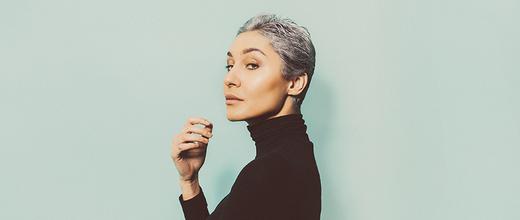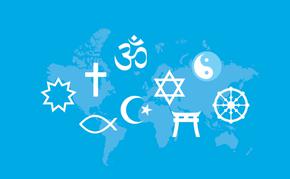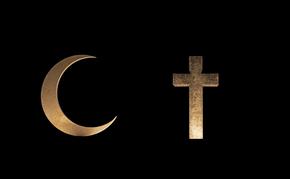The views expressed in our content reflect individual perspectives and do not represent the official views of the Baha'i Faith.
We live in an age of extreme skepticism about religion and the followers of religion.
When the Biblical commandment “Thou shall not kill” (Exodus 20:13) is broken every second somewhere on every continent, it is no wonder that many people feel skeptical about the impact of religious words on human deeds. In the Baha’i Faith, independent investigation of religious truth, without benefit of clergy, is a fundamental tenet:
The first [principle of Baha’u’llah] is independent investigation of truth; for blind imitation of the past will stunt the mind. But once every soul inquireth into truth, society will be freed from the darkness of continually repeating the past. – Abdu’l Baha, Selections from the Writings of Abdu’l-Baha, p. 202.
The variance between what people say and what they do exists in all walks of life, in every language. This variance encourages religious skepticism. We can observe the dichotomy of the religious dictum: “Love thy neighbor as thyself” – Matthew 22:27; yet we may not know our neighbors or we may actively disparage them due to preconceived notions and biases.
The challenge of living a coherent religious life is to consistently act in congruence with the core moral teachings of all Faiths. The Baha’i writings include exhortations to every human being to act with sincerity and humility:
They should conduct themselves in such manner that the earth upon which they tread may never be allowed to address to them such words as these: “I am to be preferred above you. For witness, how patient I am in bearing the burden which the husbandman layeth upon me. I am the instrument that continually imparteth unto all beings the blessings with which He Who is the Source of all grace hath entrusted me. Notwithstanding the honor conferred upon me, and the unnumbered evidences of my wealth—a wealth that supplieth the needs of all creation—behold the measure of my humility, witness with what absolute submissiveness I allow myself to be trodden beneath the feet of men ….” – Baha’u’llah, Gleanings from the Writings of Baha’u’llah, pp. 7-8.
The fact that “Mother Earth” provides the “wealth that supplieth the needs of all creation” is a powerful reminder of humility—and an essential component of the faith of many indigenous peoples.
We may question the validity of religious doctrine when we observe a disconnect between the lofty standards of humility, personal behavior and accountability and human society’s immoral or deviant behavior and lack of accountability. The Bible teaches “God is Love” (1 John 4:8), and the Baha’i teachings reiterate this essential truth:
Humanity, torn with dissension and burning with hate, is crying at this hour for a fuller measure of that love which is born of God, that love which in the last resort will prove the one solvent of its incalculable difficulties and problems. – Shoghi Effendi, Baha’i Administration, p. 62.
Understandably, skeptics doubt, deny or question the existence of this kind of universal love, when so many examples exist of its absence. Yet, if it is true that “there are no atheists in fox holes,” unimaginable catastrophes can evoke a very deep human desire for divine deliverance and intervention. Many nameless and traceless souls arise to provide aid and solace to others in times of need. Disasters inspire us to ask questions “Why me?” Or “Why would God let this happen?” In those moments, we seek a tangible manifestation of God’s eternal love for us, for humanity.
Human beings everywhere experience life’s unavoidable challenges—loss of income or a job, illness, death, loneliness or despair at world events. The light of true religion can provide a balm, an ability to transcend the material circumstances of our lives, to inspire and motivate us to make the inner, spiritual changes necessary to gain victory over our current circumstances. Yet, it must be examined, questioned, analyzed and reflected upon: each of us has that capacity as human beings. If we accept that human life has a dual material and spiritual nature, religion can prepare us for the world beyond death, for the journey of our eternal soul.
The Baha’i teachings say that every human being is born noble, that we each have the capability to know and love God. Our challenge is to ask questions, to investigate reality, to actively think and act. We can choose to live within our inner nobility and to reflect our religious values in our daily actions. To be able to be better today than yesterday and to be a cause of light to the world: what a thrilling antidote to the current miasma of despair and confusion we see around us! Like a high powered engine, we cannot achieve any forward momentum without exertion, without testing what we are made of, without overcoming obstacles, both known and unknown.
Each and every day, we all move closer to the world of dust. The Baha’i teachings indicate that we humans have the choice, and the capacity for, either spiritual stasis or regeneration. Our material lives offer us the chance to “mirror forth” in our deeds the spiritual verities of love, trustworthiness, patience, charity, kindness, honesty and peace. Each of us is on a journey, endowed with spiritual faculties, to choose to reflect in our daily actions the essence of religion or its counterfeit dogma. In the Baha’i Faith, no human intermediary can absolve us of this requirement, since Baha’is have no clergy. Baha’is know that the declaration of belief in Baha’u’llah and allegiance to his laws and principles is only the first step on their eternal journey.
Baha’is read and reflect on the Baha’i writings daily, study and meditate and translate knowledge into action to serve our communities around the world. Baha’u’llah said:
For every one of you his paramount duty is to choose for himself that on which no other may infringe and none usurp from him. Such a thing—and to this the Almighty is My witness—is the love of God, could ye but perceive it. Build ye for yourselves such houses as the rain and floods can never destroy, which shall protect you from the changes and chances of this life. – Gleanings from the Writings of Baha’u’llah, p. 261.
As human beings, our skeptical search cannot be put off by weak, unsubstantiated responses or dogmatic retorts. When a person says “I believe” is that sufficient? Surely, that person will be tested, their beliefs questioned to see if they are rooted in bedrock and not built on shifting sands.
So go ahead, be skeptical! And build your house!

















Comments
Sign in or create an account
Continue with Facebookor